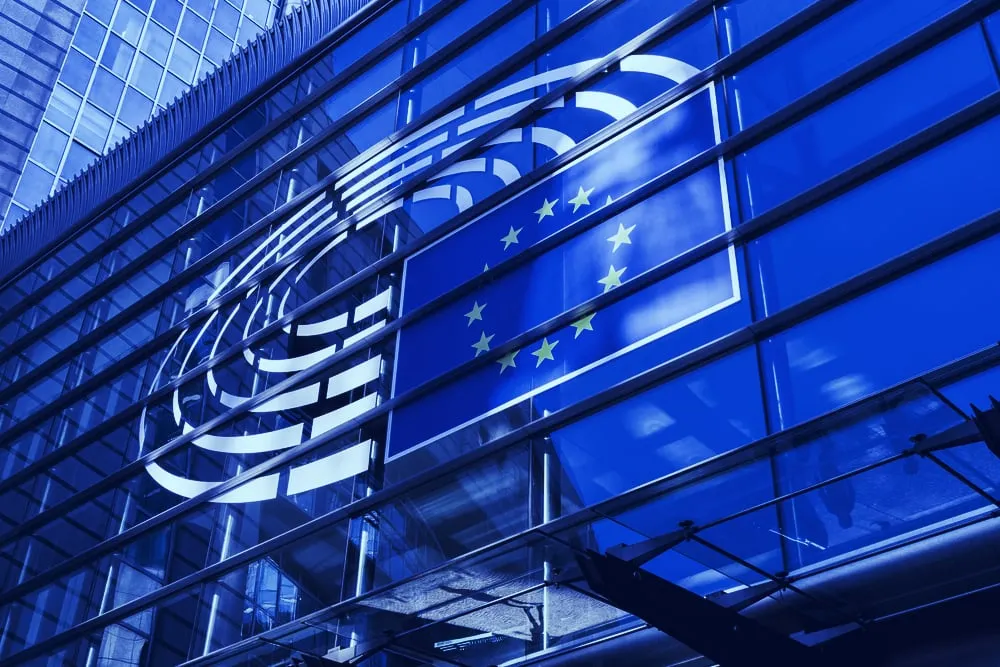#Cryptocurrency is one of the newest ways to launder money.
Our rules will now apply to the whole of the crypto sector. We will ban anonymous crypto wallets and make sure that crypto-asset transfers are traceable.
— Mairead McGuinness (@McGuinnessEU) July 20, 2021
Coin Prices
BTC
$67,980.00
0.22%ETH
$1,975.58
0.68%XRP
$1.42
-0.54%BNB
$622.41
-0.55%USDC
$0.9999
-0.01%SOL
$85.24
1.24%TRX
$0.287744
0.94%DOGE
$0.097262
-2.75%FIGR_HELOC
$1.046
1.02%BCH
$578.48
2.43%WBT
$50.71
0.18%ADA
$0.275933
-1.92%USDS
$0.999461
-0.05%LEO
$8.15
-5.47%HYPE
$29.45
-2.22%LINK
$8.85
-0.10%USDE
$0.998922
-0.00%CC
$0.160604
0.05%XMR
$320.45
-3.09%XLM
$0.155764
-3.73%USD1
$0.999282
0.00%RAIN
$0.00957189
-0.01%HBAR
$0.098534
-0.42%ZEC
$254.36
-2.48%LTC
$54.71
-0.61%PYUSD
$0.999658
0.01%AVAX
$9.01
-1.53%SHIB
$0.00000624
-4.49%SUI
$0.93481
-1.57%TON
$1.32
-0.27%WLFI
$0.117442
-2.53%CRO
$0.076631
-1.83%XAUT
$5,097.52
0.15%PAXG
$5,134.38
0.26%M
$1.35
1.37%UNI
$3.58
1.16%DOT
$1.34
-0.89%MNT
$0.631066
0.13%BUIDL
$1.00
0.00%AAVE
$118.88
-0.14%USDF
$0.996474
-0.07%ASTER
$0.70863
-2.35%PEPE
$0.0000041
-4.84%TAO
$178.99
0.39%OKB
$78.19
-1.28%BGB
$2.33
-0.09%USDG
$0.999984
-0.02%USYC
$1.12
0.00%RLUSD
$0.999908
0.01%HTX
$0.0000017
0.20%PI
$0.16379
-6.22%SKY
$0.064943
1.05%ETC
$8.83
-2.18%NEAR
$1.031
-3.31%BFUSD
$0.99878
-0.01%ONDO
$0.262681
-1.89%PUMP
$0.00209471
-0.79%ICP
$2.21
1.80%USTB
$11.00
0.00%ATOM
$2.31
-2.95%POL
$0.107411
-1.92%GT
$7.25
0.72%KCS
$8.51
0.51%WLD
$0.383251
-2.44%HASH
$0.01769851
-2.08%NIGHT
$0.058155
-3.92%QNT
$65.58
-0.28%NEXO
$0.89224
-0.56%MORPHO
$1.62
2.22%ENA
$0.103369
-5.90%USDTB
$0.999555
-0.01%KAS
$0.0308407
0.22%FLR
$0.00945392
0.86%TRUMP
$3.43
-2.60%EUTBL
$1.23
0.00%ALGO
$0.088133
-2.31%USDD
$0.999895
0.01%RENDER
$1.44
-3.09%JAAA
$1.027
0.00%FIL
$0.950365
-1.71%OUSG
$114.37
0.00%XDC
$0.03541033
-0.15%USDY
$1.11
0.60%APT
$0.858089
-3.06%VET
$0.00758809
-2.61%BDX
$0.080113
0.01%JTRSY
$1.095
0.00%PIPPIN
$0.571829
15.51%USD0
$0.998281
0.08%ARB
$0.095783
-4.30%BONK
$0.00000615
-4.06%GHO
$0.999669
0.02%STABLE
$0.02853298
-4.16%JUP
$0.15552
-1.41%A7A5
$0.01280616
-1.18%TUSD
$0.99909
0.02%USDAI
$0.999814
-0.01%FTN
$1.086
-0.23%SEI
$0.070027
-1.26%DCR
$26.95
11.41%EURC
$1.18
-0.01%STX
$0.24925
-2.90%CAKE
$1.31
1.20%DASH
$34.37
0.11%KITE
$0.237418
-1.63%PENGU
$0.00670823
-2.99%VIRTUAL
$0.634968
-1.78%XTZ
$0.38381
-2.54%KAU
$166.71
-3.41%FDUSD
$0.9989
-0.02%IP
$1.081
-2.02%LIT
$1.51
1.61%JST
$0.0427611
-0.55%FET
$0.162465
-2.23%CTM
$0.083855
1.25%INJ
$3.64
3.72%CHZ
$0.03411304
-5.06%ZRO
$1.73
2.95%CRV
$0.233916
-4.08%USX
$0.99962
-0.01%ETHFI
$0.453098
-3.36%BTT
$0.00000034
-0.67%PRIME
$1.021
0.02%KAIA
$0.056524
1.01%NFT
$0.00000033
-0.86%SUN
$0.01694861
0.22%GNO
$120.51
2.14%BSV
$15.89
-1.99%ADI
$3.24
2.80%PYTH
$0.053038
-1.99%H
$0.164407
1.72%AERO
$0.326416
1.00%IOTA
$0.068159
-2.07%SPX
$0.313602
-3.32%GRT
$0.02719037
-6.94%CRVUSD
$0.99707
0.05%FLOKI
$0.00002969
-3.36%TIA
$0.324024
-4.05%JASMY
$0.00570469
-2.76%HNT
$1.48
1.19%FRAX
$0.994641
0.29%LDO
$0.320759
-2.50%OHM
$17.23
-0.84%CFX
$0.051837
-2.36%OP
$0.124863
-5.11%TEL
$0.00278367
2.31%BTSE
$1.63
1.41%SYRUP
$0.226429
-0.39%ENS
$6.56
-0.71%ZK
$0.0195776
-2.98%2Z
$0.071606
-3.59%AB
$0.00248722
0.27%STRK
$0.04422352
-3.47%NUSD
$0.999441
-0.02%AXS
$1.31
-1.24%SAND
$0.082775
-2.97%USTBL
$1.075
0.00%YLDS
$1.00
0.00%MON
$0.02017268
-3.09%USDA
$0.988263
-0.00%WIF
$0.217633
-3.37%AUSD
$0.999638
0.01%TWT
$0.517239
-0.78%BCAP
$22.86
0.00%ZBCN
$0.0020913
-3.54%ULTIMA
$5,394.34
-4.11%APEPE
$0.00000097
0.29%XPL
$0.09436
-2.60%UDS
$1.59
2.43%SIREN
$0.271883
22.27%PENDLE
$1.20
-1.24%LUNC
$0.00003613
-2.37%THETA
$0.197024
-5.76%NEO
$2.71
-1.72%VVV
$4.31
0.72%PC0000031
$1.00
0.00%VSN
$0.052863
-0.84%XCN
$0.00503358
-1.31%BORG
$0.190335
0.26%FF
$0.079449
-2.49%MANA
$0.095258
-3.70%FARTCOIN
$0.180381
-2.40%GALA
$0.00379938
-3.78%BAT
$0.120166
-0.86%MYX
$0.940699
-18.28%FDIT
$1.00
0.00%9BIT
$0.02172263
25.75%TIBBIR
$0.175782
7.02%BARD
$0.778432
2.75%WFI
$2.18
-2.69%CVX
$1.89
-4.70%IUSD
$0.999939
0.04%RAY
$0.634766
-1.25%COMP
$17.64
-2.92%REAL
$0.053386
-0.59%MX
$1.81
0.25%GLM
$0.164813
-1.73%FLUID
$2.09
0.31%KOGE
$47.99
0.01%S
$0.04267478
-1.84%XEC
$0.00000795
0.09%SATUSD
$0.993398
-0.11%EURS
$1.26
0.02%RIVER
$8.00
-3.94%SENT
$0.02158912
-8.70%HUNT
$7.90
57.06%MWC
$13.96
1.06%TRAC
$0.341354
3.56%USDF
$0.998546
0.03%THBILL
$1.014
0.14%RAVE
$0.64201
10.66%GUSD
$0.999689
0.18%SNX
$0.424426
8.32%WEMIX
$0.309616
-0.81%RUNE
$0.406424
-1.78%JTO
$0.321047
5.19%0G
$0.65466
-7.52%IMX
$0.163338
-2.59%BAN
$0.134468
5.75%RLB
$0.076551
3.41%SFP
$0.265121
-4.08%A
$0.081304
-0.60%GOMINING
$0.325433
0.32%B
$0.131939
0.22%EGLD
$4.49
-3.63%ACRED
$1,097.02
-0.02%1INCH
$0.092547
-1.71%AR
$1.99
-2.90%ZANO
$8.56
-3.66%KTA
$0.261398
2.31%BERA
$0.593996
1.49%AMP
$0.00149869
-0.68%DOLA
$0.995001
-0.09%COCO
$0.125845
6.43%WAL
$0.077529
-4.05%OZO
$0.130768
0.01%LION
$0.00403922
-1.23%CUSD
$0.990875
0.73%PUSD
$0.995734
0.00%COW
$0.211143
1.90%BMX
$0.34155
-3.74%LPT
$2.32
-1.35%DEXE
$2.46
-2.21%BEAM
$0.00223575
-2.17%FRXUSD
$0.999844
-0.01%CASH
$0.999765
0.01%REUSD
$1.062
0.03%KMNO
$0.02763023
-0.56%
